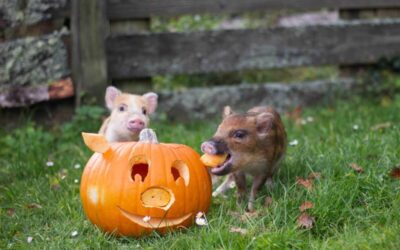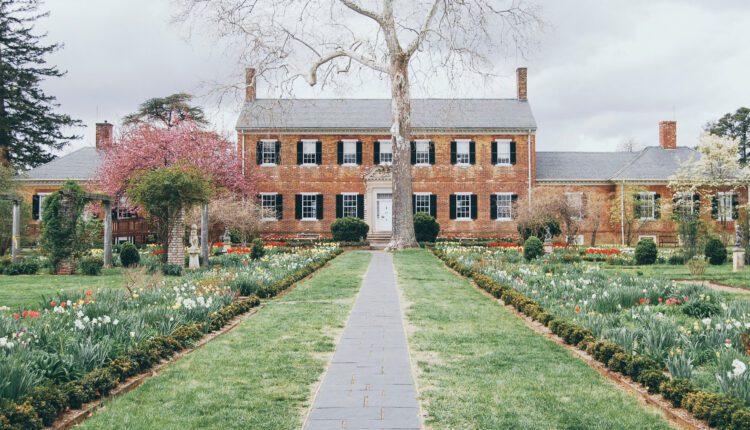
Photo courtesy of Shutterstock.
Virginia is home to numerous castles and manor houses, but these 10 are extra enchanting.
Once the epicenter of North American colonialism, early Virginia boasts a rich architectural heritage influenced by English designs. Wealthy colonial leaders and later enthusiasts constructed grand castles and manors, some even deconstructed from original English locations and shipped across the Atlantic.
Many of these historic structures have served and have been meticulously restored, offering a glimpse into Virginia’s storied past. Here are 10 of the most enchanting castles and manor houses you must explore.
Bacon’s Castle
Location: Surry
The oldest brick dwelling in North America, Bacon’s Castle was built for Arthur Allen and his family in 1665. It gained the name “Bacon’s Castle” a little over 10 years later after Nathaniel Bacon’s men occupied it for four months during Bacon’s Rebellion.
A rare example of High Jacobean architecture, the castle came into the hands of Preservation Virginia in the 1970s. The group meticulously researched, restored, and furnished it throughout the 1980s. Interior tours are offered daily from March to December, with adult tickets costing $15.
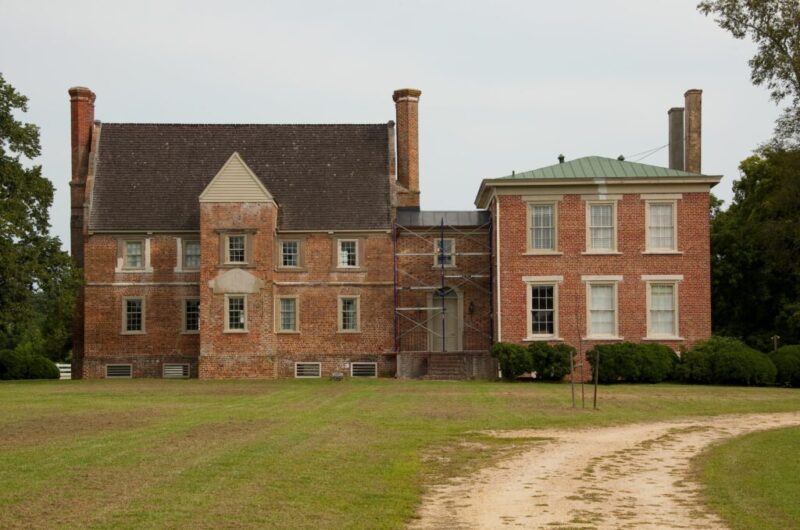
Photo courtesy of Virginia Tourism Corporation.
Virginia Tourism Corporation, www.Virginia.org
Melrose
Location: Fauquier County
With its battlemented stone walls, central tower, and dramatic siting, Melrose serves as a prime example of the mid-19th-century Gothic Revival. Constructed between 1857 and 1860 on the edge of a cliff near Casanova by the English-trained Edmund George Lind, the rugged country house is named for Melrose Abbey in Scotland.
Stratford Hall
Location: Stratford
Dating to the 1730s, Stratford Hall is described as “one of the great houses of American history.” A National Historic Landmark, the hall was once home to two influential patriots, brothers Richard Henry Lee and Francis Lightfoot Lee. They were the only brothers who signed the Declaration of Independence. The Virginia Department of Historic Resources describes it as being unique among colonial plantation houses due to its H-shaped plan, clustered chimney stacks, and elegantly paneled great hall.
The house is currently open to guests from 10 a.m. to 5 p.m., Wednesday to Sunday. Tickets for self-guided audio tours are $15 for adults.
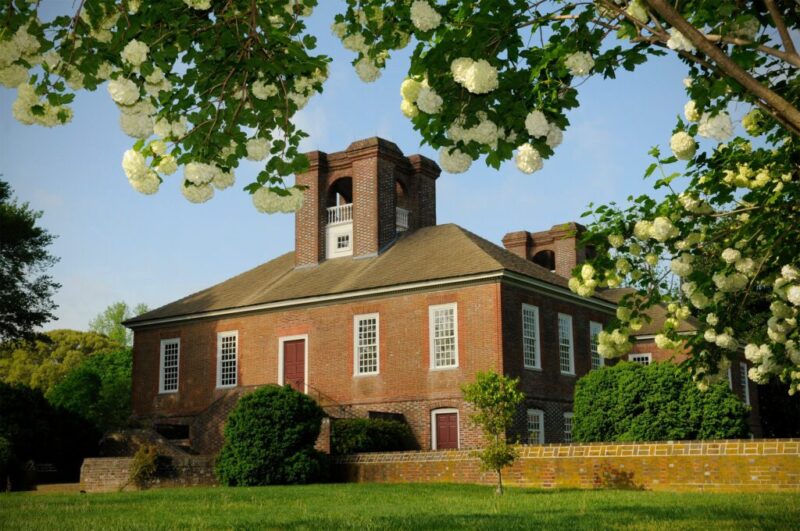
Photo courtesy of Virginia Tourism Corporation.
Windsor Castle Park
Location: Smithfield
The manor house at Windsor Castle Park was constructed during the 1720s by the Smith family, which obtained 1,450 acres of Isle of Wight County land in 1637. Made of brick, the main floor originally served as the living space with four large rooms.
Three other families have owned the home, but it was turned into a public park in 2010 after the founder of Smithfield Foods, Joseph W. Luter III, donated millions of dollars to the town of Smithfield to acquire the property. In 2019, the house was renovated with the goal of keeping its historic charm while providing modern amenities.

Photo courtesy of Virginia Tourism Corporation.
Wilton House
Location: Hartfield
Wilton House is a well-preserved 1763 T-shaped plantation house that once served as the seat of the influential colonial Churchill family, squarely in the center of their vast landholdings between the Piankatank River and Rappahannock River along the southern end of Middlesex County in the Tidewater.
As a means of preserving its historical integrity, Preserve Virginia bought the house in 2002 to place historic easements on it, before selling it to a private owner. An extensive preservation and modernization project followed. Today, the house can be visited and rented for a stay or event. Before visiting, review this handy guide to the house.
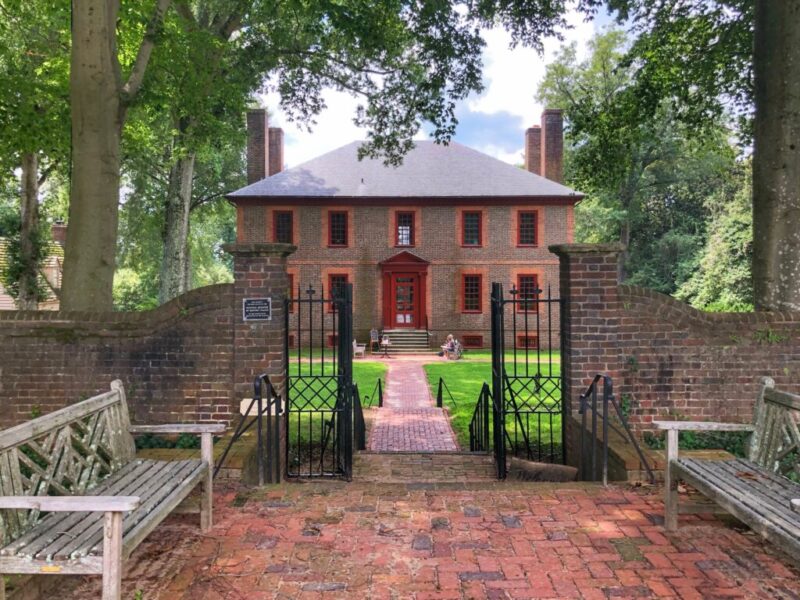
Photo courtesy of Virginia Tourism Corporation.
Chatham Manor
Location: Fredericksburg
Since before the nation’s founding, Chatham Manor has dominated the heights opposite Fredericksburg on the banks of the Rappahannock River. Built by enslaved laborers and craftsmen in 1771 for William Fitzhugh, the large Georgian structure served as a symbol of the Fitzhughs’ wealth.
The family later fell on hard times, which resulted in the selling of the manor to the Lacy family. It again made history when it was vacated by the Confederate-aligned Lacys during the Civil War and was turned into the US Army headquarters during the Battle of Fredericksburg. After a string of owners who had trouble keeping it up, the manor was purchased by the Devores who transformed it from a plantation home into a showy, country retreat.
Now part of the National Park Service, the manor is open to visitors daily from 9 a.m.-5 p.m.
Pythian Castle
Location: Portsmouth
Although not an actual castle, the three-story brick and stone Pythian Castle is nonetheless referred to as one. Constructed between 1897 and 98, it serves as one of the best examples of Romanesque Revival architecture in the city. According to the Virginia Department of Historic Resources, it’s typical of the period’s fraternal lodges. Secret organizations, like the Knights of Pythias, often served as patrons of stylistically conspicuous buildings in the late 19th century.
Guads Mexican Restaurant is now located on the first floor of the building, so you can enjoy a taco and drink while taking in the architecture.
Virginia House
Location: Richmond
Virginia House is a romantic English Tudor manor house that was relocated to Richmond’s Windsor Farms neighborhood in 1925 where it’s nestled on a hillside overlooking the James River. It was built with the materials of a 16th-century English manor house, which was meticulously deconstructed.
Now owned by the Virginia Historical Society, the manor’s original woodwork and antiques, like Oriental carpets and fine silver and China, are preserved to appear as it did when the original Richmond owners, the Weddell family, first lived in it. It’s currently used for private events, like weddings.
Agecroft Hall & Gardens
Location: Richmond
Agecroft Hall & Gardens bills itself as a “16th-century gem in the heart of Central Virginia.” The hall was originally located in Lancashire, England before being relocated via a ship and train voyage to Richmond in the 1920s where it now sits on the banks of the James River.
The origins of the hall date to 1376, however many portions of it were constructed in the late 15th and early 16th centuries. During the reigns of the infamous Tudor and Stuart dynasties, the hall served as the home of the well-regarded Langley and Dauntesey families.
In the 1920s, Richmond businessman T.C. Williams, Jr. and his wife, Elizabeth, purchased the unoccupied home with the plan to relocate it to former farmland. Today, it serves as a museum dedicated to telling English history. Visitors can choose self-guided or guided tours, with general admission starting at $6 for adults.
Oatlands Historic House and Gardens
Location: Leesburg
Outlands Historic House is a circa 1804 Greek Revival brick mansion that sits on an expansive 360-acre National Trust for Historic Preservation site.
Open to the public since 1966, the house can be visited for guided tours from Thursday to Saturday.
This article first appeared on Good Info News Wire and is republished here under a Creative Commons license.

15 Virginia holiday light displays you won’t see anywhere else
From illuminated garden trails to coastal spectaculars, here are some of Virginia’s most unique and memorable holiday light displays. Virginia...

10 ways to give back in Virginia without spending a dime
From volunteering at a state park or library to mentoring youth, here are 10 meaningful ways to give back in Virginia without spending a dime. ...

Spread holiday cheer to Virginia children with these 14 toy drives
Give back this holiday season by helping one of the many community toy drives happening in Virginia, ensuring a child in need doesn’t have to go...

18 Virginia food pantries to donate your time, money, & food to this holiday season
If you’re looking to give back this holiday season, here are 18 food pantries in Virginia where you can donate your time, money, and food to help...

Virginia’s 16 most magical winter festivals
From festive lights and carolers to cookie decorating and ice skating, Virginia’s winter festivals are full of holiday fun. Discover the ones you...

12 top things to do in Lynchburg, Virginia
From exploring historic districts to going on outdoor adventures, here are 12 of the top things to do in Lynchburg. Situated in the rolling hills...





